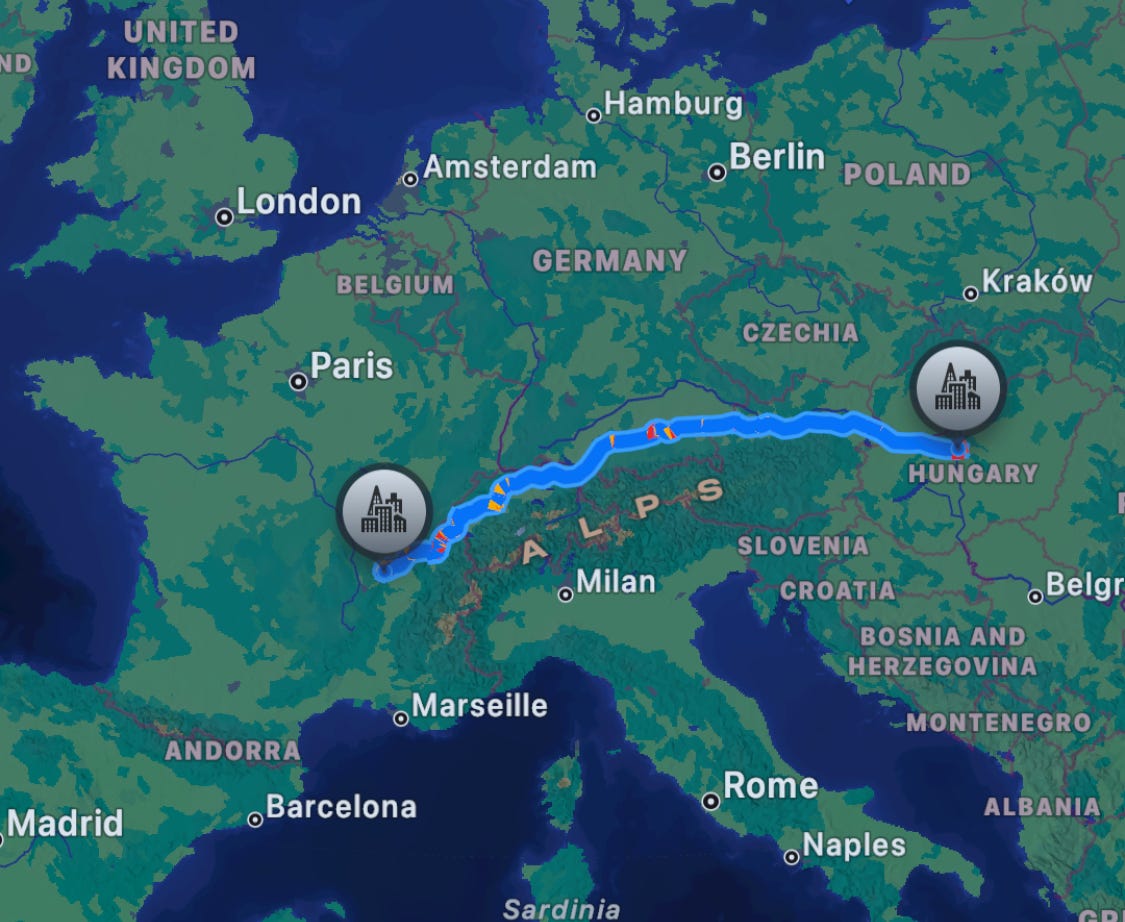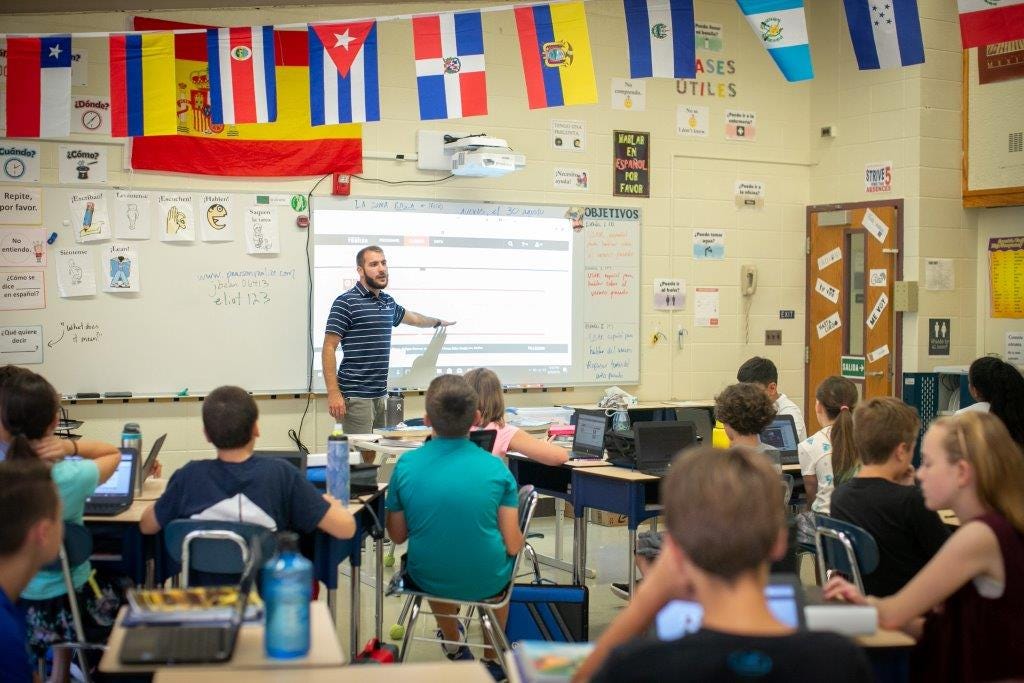Are Americans Bad at Learning Languages? (Put Your Answer in the Poll!)
Is Language Teaching in American Schools is Falling Short? Answer the Poll Below!
As most of you have read about me at this point, I grew up in a small, rural town in California with very little exposure to anyone who didn’t speak English. As such, I was raised monolingual, despite my dad’s parents and grandparents being from Québec; his mom didn’t teach him or his siblings any French, so that language of our family heritage was lost. It wasn’t until I lived in France for 2 years and learned French that the French language came back into my family—but that’s a whole different story that I’ll tell in a future post (look out for “Why Speaking French is Important to Me”).
I have become a rare case: I am now obsessed with learning and speaking other languages. I think it is thrilling each time I am able to communicate effectively in another language, and that adrenaline rush keeps me wanting more.
At first, I didn’t realize what the rest of the world—and even other Americans (U.S.)—thought about Americans’ language learning skills. However, after living in France and visiting Switzerland, Spain, Francophone Canada, Japan, etc., I discovered how many other people throughout the world view U.S. citizens’ overall language abilities.
Spoiler alert: people think we suck at it.
The real question though… Are they right? Are Americans actually bad at learning other languages?
I think that the answer is a resounding no. Americans can learn languages, and some are quite dedicated and talented at it. So why aren’t more Americans bilingual? (Only about 20% of Americans are at least bilingual.)
Well, most Americans have never—and might not ever—need another language other than English. And, according to the data, American schools are just not that great at teaching languages. What programs do exist are often inconsistently run or are underfunded.
But what can be done about this? Is anything being done?
Maybe Americans Just Don’t Need Other Languages?
So, here’s the thing.
The United States is a large country. Like, really, really big. The USA is the third largest country in the world (by land mass), behind only Russia and Canada, both of which have vast areas of uninhabitable frozen land.
Because of this, many Americans may just never leave their gigantic country of origin. In Europe, any appreciable amount of traveling causes you to travers international borders, entering into new areas with new people that speak new languages. For example (using Apple Maps):
About 14hr 12 min. of driving will get you from Lyon, France to Budapest, Hungary. That route would take you from France through Switzerland, Germany, Austria, and finally to Hungary—five countries that speak four different languages (French, Italian, German, and Hungarian) with one of those consisting of three different dialects (German, Austrian German, and Swiss German).
About 11hr 38 min. of driving will get from from El Paso, Texas to Beaumont, Texas. That’s right. Almost 12 hours of driving, and you’d still be in Texas. A more comparable 14hr and 25 min. of driving would get you from El Paso, Texas to Baton Rouge, Louisiana, just one state over. Let that sink in—five countries versus two states for the same amount of driving.
With a country that big, it makes sense why many Americans never learn another language. Europeans are used to being around people from other places who speak other languages, but in the U.S., you could travel all 50 states and never need to speak anything other than English. And some Americans do just that—there are about half as many American passports in circulation as there are Americans.
Maybe American Schools Are Just Not Good at Teaching Languages?
Think back to your high school Spanish/French/German/whatever class for a moment. How much did you learn? How much can you remember? Do you think you could still speak it today if you ran into a native Spanish/French/German/whatever speaker?
If you said no, there might be a reason for that too.
The first issue is that only about 20% of American students are learning a second language, compared to an average of 92% of students in European countries. American students are not even taking language courses when they are available.
The Worldwide Language Index (prepared by digital learning platform Preply), used 18 different metrics to analyze 30 nations across Europe and North America, ranking the countries according to how conducive of an environment each country is for learning a foreign language.
The U.S. ranked last in the index.
Schools in the U.S. are not matching up to other schools around the world in terms of foreign language education. This is hindering Americans’ opportunities and abilities to learn and engage with foreign language learning from an early age, thereby keeping many Americans from ever exploring new languages. It is all too common for American adults to think:
I am too old. I can’t learn a new language now, I am stuck in my ways. Only kids can learn new languages effectively.
I argue that that couldn’t be further from the truth. I didn’t really start learning French until I was 18, after high school (I took two years in high school, but as we have established, that didn’t amount to much). Then, when I was 23, I took the ACTFL Oral Proficiency Interview and scored a “superior” in French. Since then, I have taught French to others professionally and continued to learn other languages. I am now almost 30, and I don’t ever plan on stopping. My—and your—adult brain is just as capable of acquiring new languages as a child’s, with a little hard work, and maybe some help now and then.
What Can Be Done? What Is Being Done?
It can be demoralizing to see these statistics, especially if you’re a monolingual American who has ever thought about learning a new language and who just hasn’t done it yet.
Well, some organizations are doing what they can to make up for the deficiencies in traditional American foreign language education.
ACTFL
The American Council on the Teaching of Foreign Languages (ACTFL) has a specific vision to create “an interconnected world where everyone benefits from and values a multilingual and multicultural education.”
We provide resources to address challenges to meet the changing needs of language educators and their learners. ACTFL’s innovative quality research, standards, assessments, professional development, and publications empower us to advance the practice of language learning.
Critical Language Scholarship
This scholarship program is sponsored by the U.S. Department of State, and serves as part of a larger effort to increase the number of Americans studying foreign languages that are “critical to our national security, economic prosperity, and engagement with the world.” The program seeks to provide groups of U.S. students an opportunity to study the language and culture in a country/location where the target language is commonly spoken.
The Critical Language Scholarship (CLS) Program is an immersive summer opportunity for American college and university students to learn languages essential to America's engagement with the world.
Massive Online Open Courses (MOOCs)
As I talked about in a previous article, “Why You Should Learn a New Language, Like, Right Now,” programs such as Coursera, edX, MIT OpenCourseWare, and Alison offer free courses that are completely online and self-paced. This removes a significant barrier for some people who like structured courses but who might not have the time or money to invest in a college or other expensive private language course. (Click the article below for more info)
Conclusion
There is hope! Americans aren’t inherently bad at learning languages. There is no secret biological disadvantage that keeps Americans from mastering new languages. All it takes is some hard work and some support from others around you. I would love to talk with you about your language learning journey, so feel free to reach out!










I think we’re bad at finding programs that work for us. (Maybe because they’re not readily available?) DuoLingo is a popular language learning app, but it doesn’t work for my learning style. It wasn’t until I started using Pimsleur, which allows me to just listen and repeat, that I felt like I was actually making progress in learning a language. I think we tell ourselves if something works for others, it needs to work for us, otherwise we’re doing something wrong. That’s not true! We just need to find language programs that work for us!
I think Americans who are native English speakers are lazy about learning languages because for many of them, English is all they’ll need. It is the preeminent language of business around the world. Most Americans won’t live for extended periods of time outside the US. However, this attitude cheats people who remain monolingual. They miss out on so many opportunities, whether socially, culturally, artistically, or in business, to say nothing of the cognitive benefits of learning a new language.